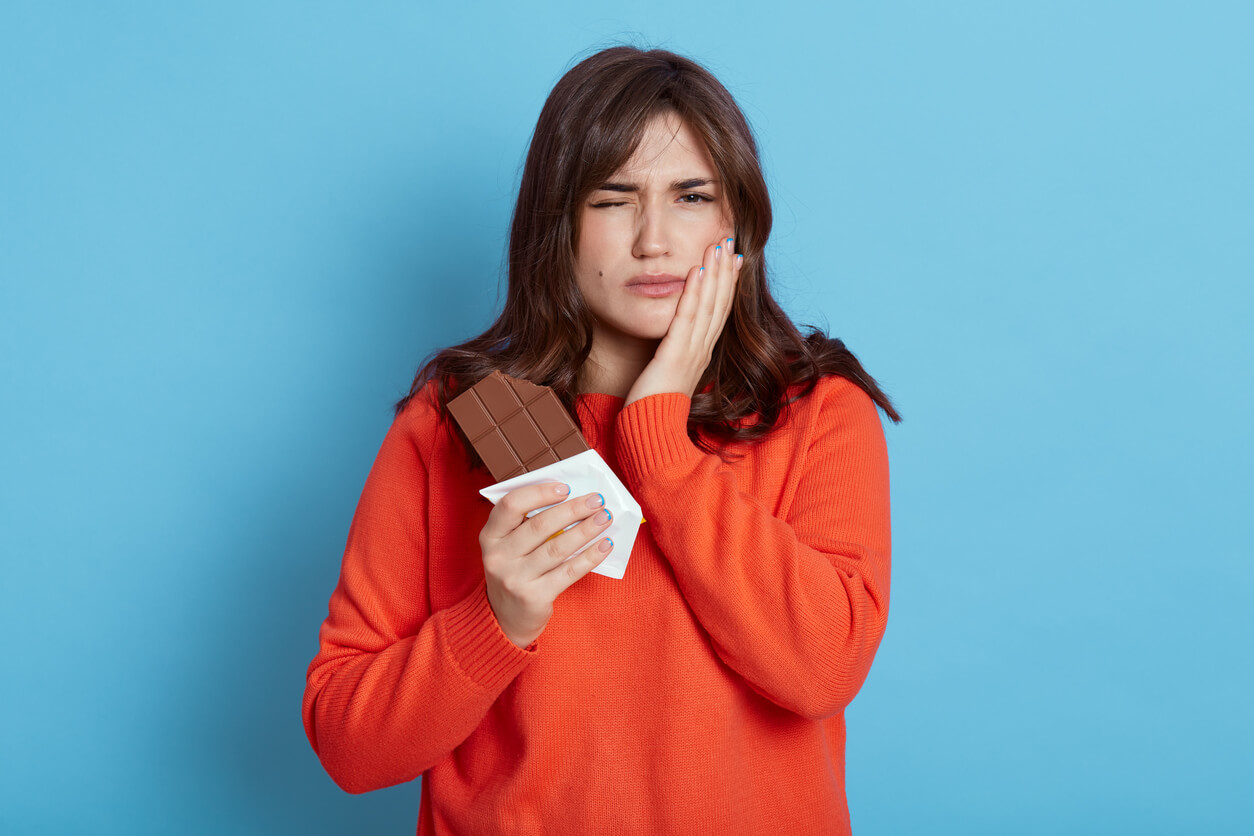If you’ve recently had a crown put in and are experiencing sensitivity, you’re not alone. It’s a typical reaction as your mouth adjusts to the new addition. The initial discomfort may be unsettling, but you can ease the transition by learning the cause and finding ways to manage it.
In this article, we’ll explain what triggers tooth sensitivity after a temporary crown and a permanent crown, and provide you with helpful tips to manage it effectively. Our goal is to help you maintain your dental well-being and make your new crown improve your smile comfortably.
What Causes Sensitivity After a Crown?
Sensitivity after a crown occurs because the nerves are irritated or the tooth and surrounding gum tissue change. Because the placement process requires some filing, it affects some nerve sensation in that region.
Also, dental cement used to set the crown either irritates the gums or exposes minuscule portions of dentin that are sensitive, leading to greater sensitivity. As your mouth adjusts, sensitivity generally diminishes. However, continue to care and observe regularly to maintain a comfortable and successful adaptation.
What to Do to Relieve Sensitivity After a Crown?
Experiencing tooth sensitivity after a dental crown placement is common and can be managed effectively. Taking these proactive steps can alleviate discomfort and reduce sensitivity:
Practice Good Dental Hygiene
Use a soft-bristled toothbrush to reduce mechanical pressure on sensitive teeth. Keeping the gum line and entire visible portion of the crowned tooth clean prevents tooth decay and maintains optimal oral health. Fluoride toothpaste can strengthen tooth enamel and help alleviate sensitivity after crown placement.
Modify Your Diet
Opt for softer foods to prevent additional stress on the crowned tooth, especially during the initial adjustment period. Avoid hot and cold drinks, as extreme temperatures can trigger tooth sensitivity to cold after a crown and cause oral discomfort. A tooth-friendly diet rich in nutrients and low in sugary foods can support healing and minimize sensitivity.
Be Mindful of Temperature Extremes
Limit exposure to hot or cold food, as well as cold temperatures, which might heighten sensitivity. Sensitivity to hot and cold is a common occurrence after having crowns, so this is a good way to avoid it. Allow the tooth to adjust naturally by consuming lukewarm or room-temperature foods and drinks.
Manage Stress and Teeth Grinding
Teeth grinding increases pressure on a crowned tooth and potentially causes increased tooth sensitivity after a permanent crown. Practice stress-reduction techniques and consider using a mouth guard if grinding teeth is a concern. Addressing this issue protects both the damaged tooth and natural teeth from further damage.
Monitor for Signs of an Ill-Fitting Crown
An ill-fitting crown can cause ongoing discomfort and heightened sensitivity, so it’s essential to check for fit issues. If you experience persistent tooth pain, increased sensitivity, or gum irritation around the dental crown, contact your dentist. A proper fit allows the dental crown to function effectively without causing unnecessary oral discomfort.
Use Desensitizing Products
Desensitizing toothpaste or special oral rinses can reduce sensitivity by blocking exposed dentin and microscopic tubules. Regular use alleviates sensitivity and supports the healing process of the tooth and surrounding tissues. Look for products designed specifically for sensitive teeth to manage crown sensitivity effectively.
Avoid Acidic and Sticky Foods
Acidic foods can weaken tooth enamel, while sticky foods can dislodge the crown or increase sensitivity. A mindful approach to eating helps maintain the functionality of the crowned tooth and surrounding gum tissue. Choose foods that support a balanced, tooth-friendly diet to maintain healthy teeth and gums.
When to Contact Your Dentist
Tooth sensitivity following a dental crown placement is a common experience and usually subsides as your tooth adjusts. In certain situations, you should contact your dentist to protect the success of the crown procedure and maintain your oral health.
- Prolonged Sensitivity. If you experience tooth sensitivity that persists beyond a few weeks after the permanent crown placement, contact your dentist. An underlying issue, such as exposed dentin or persistent irritation of a tooth’s nerve, might cause this.
- Intense or Increasing Pain. Severe pain, especially with cold foods and drinks, may signal a problem with the dental crown or the underlying tooth. Persistent pain after the crown procedure could suggest tooth infection or damage to the tooth’s nerve.
- Sensitivity to Extreme Temperatures. A tooth with a crown might feel sensitive to cold and hot substances due to an issue with the crown material or a damaged tooth. If the sensitivity worsens over time, it might affect your natural teeth and require a professional evaluation.
- Inflamed Gums or Surrounding Tissues. Newly crowned teeth might have swelling or inflammation along the gums or tissue edges. If these symptoms do not improve, they could lead to further complications, such as a root canal infection.
- Difficulties with Biting or Chewing. If eating sticky foods or regular meals causes discomfort, the crown placement may need adjustment. Proper dental crown placement allows for natural biting without discomfort or pain.
- Signs of Tooth Decay. New or lingering signs of tooth decay around the crown, such as sensitivity or visual decay, require prompt attention. Decayed teeth beneath a crown can threaten its stability and your oral health.
- Lingering Crown Sensitivity: If crown sensitivity lingers or worsens, especially when consuming acidic foods or cold drinks, visiting your dentist is essential. This might be related to the healing process or an issue requiring immediate intervention.
Frequently Asked Questions
Is It Normal to Have Tooth Sensitivity After a Crown?
Yes, experiencing tooth sensitivity after a dental crown placement procedure is normal. This temporary sensitivity occurs as the tooth and surrounding gum tissue adjust, and it often resolves within a few weeks.
How Long Does Tooth Sensitivity Last After a Dental Crown Placement?
Tooth sensitivity typically subsides within a few weeks after placing a new crown. If sensitivity persists for months, underlying issues like exposed dentin or an ill-fitting crown might cause it and require professional attention.
Can Metal Crowns Cause More Sensitivity Than Other Crown Materials?
Metal crowns may cause sensitivity for some individuals due to thermal conductivity, but crown sensitivity often depends more on the fit and the underlying tooth’s condition. If you experience ongoing discomfort, a dentist can provide a proper evaluation.
Is It Possible for a Dental Crown to Cause Pain Months After Placement?
Tooth sensitivity months after a crown placement may signal issues such as a poorly fitting crown or dental decay. Consulting with a reliable dentist is essential to determine the cause and take corrective action.
Should I Worry About Permanent Crown Sensitivity if I Had Root Canal Therapy Before the Crown?
Permanent crown sensitivity is less likely after root canal therapy, as the nerve is removed during the procedure. However, if sensitivity occurs, it might be related to the crown material or fit, and a dental evaluation is advised.
Restore Your Comfort and Confidence With Expert Dental Crown Care
Dealing with tooth sensitivity after a crown is common, but lasting discomfort isn’t something you should ignore. With the right care and attention, your crowned tooth can stay strong, functional, and pain-free for years to come.
At Mann Family Dental, we specialize in providing high-quality dental crown services tailored to your needs. Whether you’re adjusting to a new crown, experiencing lingering sensitivity, or need a crown repair or replacement, our experienced team is here to help. Using advanced technology and personalized treatment plans, we work to restore your comfort and keep your smile at its best.
Contact Mann Family Dental today to schedule your appointment and experience expert care you can trust.






